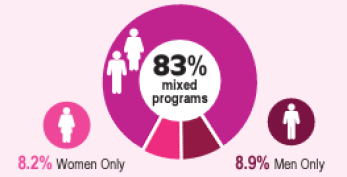

There is increasing interest and evidence for the use of cannabinoid medications in the treatment of cannabis use disorder, but little examination of the correlates of successful treatment. This paper is a secondary...
Mimořádný stav COVID-19 bezprecedentním způsobem otestoval veřejné zdraví, lékařskou a veřejnou bezpečnostní infrastrukturu Spojených států (USA). Jako ústřední bod pro veřejné zdraví ve svých komunitách byla nástupem pandemie...
Tento měsíc, 9. listopadu 2022, nabídlo setkání partnerů DDR International Narcotics and Law Enforcement Affairs (INL) diskusi o zajištění kvality a zahrnovalo dvě prezentace:
A close relationship between a parent and a child and parental acceptance can mediate the appropriate self-acceptance of an adolescent, which is an important variable related to personality and a pillar of emotional health...
Contingency management (CM) is a psychological treatment based on operant conditioning. It consists of providing incentives in exchange for achieving a target behaviour such as abstinence or other treatmentrelated variables (e.g. session...
Electronic nicotine delivery systems (ENDS) generate an aerosol by vaporising e-liquids that usually consist of propylene glycol (PG), vegetable glycerine (VG), and other ingredients (water, nicotine, and flavours). The...
In many countries families have rarely been involved in addressing treatment and interventions for family members with substance use disorders (SUDs). The aims of this study were to measure the influence of substance use on...
Leisure can be a context that can promote positive adolescent development, but it can also be a context that contributes to adolescents engaging in risk behaviours.
The aim of this study is to determine the extent...
Summary
War in Ukraine has inevitably led to the country's health system functioning at reduced capacity. Attacks near hospitals and active military operations force people to change their place of residence and flee from the war to...
Canada’s Low-Risk Alcohol Drinking Guidelines were originally published by CCSA in November 2011 and were the result of the work of alcohol research experts in Canada. Since then, substantial new research on the association between alcohol...
The European Web Survey on Drugs1 collected data during March and May 2021 from people who use drugs, are aged 18 or older, and live in 21 EU and 9 non-EU countries including Lebanon. In this period, the populations in many European and...
In somatic health care settings, interdisciplinary collaborations (where various disciplines work coordinated and interdependently toward shared goals) are considered to yield higher team effectiveness than multidisciplinary...
Aftercare programs for people with substance use disorders (PWSUD) are frequently challenged with a number of overlapping obstacles, including uncertain policy consequences and a lack of resources. Despite demographic variety...
In the United States, access to buprenorphine remains low and disparities regarding who receives treatment have emerged. Federal laws have regulated buprenorphine delivery, ultimately limiting its implementation more broadly...
Beginning in the 1990s, non-medical use of prescription opioids (POs) became a major public health crisis. In response to rising rates of opioid dependence and fatal poisonings, measures were instituted to decrease the...
ÚVOD:
Evropské kurikulum prevence (EUPC) a univerzální léčebné kurikulum (UTC) jsou paradigmaty úsilí o dosažení mezinárodního standardizovaného školení pro snížení poptávky po drogách. Oba učební osnovy jsou založeny na poznatcích a...
BACKGROUND:
During the last ten years, Georgia made several important accomplishments in responding to the country’s drug problem. Specifically, in 2011, an interagency national drug coordinating body was established within the Ministry...
BACKGROUND:
The Universal Treatment Curriculum (UTC) is offered to the academic community to integrate substance use-specific knowledge, skills, and evidence-based practices into the continuing professional development of current and...
INTRODUCTION:
Access to drug treatment services in Nigeria remains low due to a severe shortage in the drug treatment workforce. Plans are underway to address the workforce shortage by introducing drug addiction training programs in...
Share the Knowledge: ISSUP members can post in the Knowledge Share – Sign in or become a member